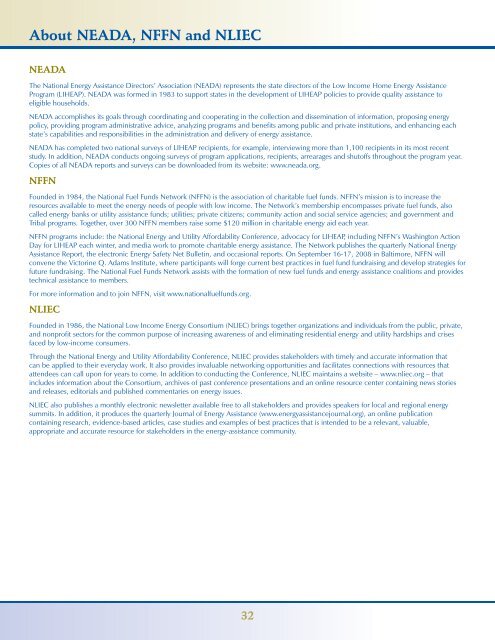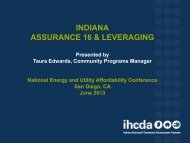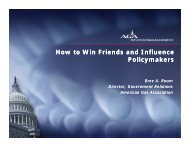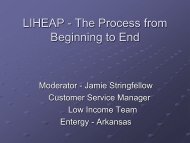2008 - National Energy and Utility Affordability Conference
2008 - National Energy and Utility Affordability Conference
2008 - National Energy and Utility Affordability Conference
You also want an ePaper? Increase the reach of your titles
YUMPU automatically turns print PDFs into web optimized ePapers that Google loves.
About NEADA, NFFN <strong>and</strong> NLIEC<br />
NEADA<br />
The <strong>National</strong> <strong>Energy</strong> Assistance Directors’ Association (NEADA) represents the state directors of the Low Income Home <strong>Energy</strong> Assistance<br />
Program (LIHEAP). NEADA was formed in 1983 to support states in the development of LIHEAP policies to provide quality assistance to<br />
eligible households.<br />
NEADA accomplishes its goals through coordinating <strong>and</strong> cooperating in the collection <strong>and</strong> dissemination of information, proposing energy<br />
policy, providing program administrative advice, analyzing programs <strong>and</strong> benefits among public <strong>and</strong> private institutions, <strong>and</strong> enhancing each<br />
state’s capabilities <strong>and</strong> responsibilities in the administration <strong>and</strong> delivery of energy assistance.<br />
NEADA has completed two national surveys of LIHEAP recipients, for example, interviewing more than 1,100 recipients in its most recent<br />
study. In addition, NEADA conducts ongoing surveys of program applications, recipients, arrearages <strong>and</strong> shutoffs throughout the program year.<br />
Copies of all NEADA reports <strong>and</strong> surveys can be downloaded from its website: www.neada.org.<br />
NFFN<br />
Founded in 1984, the <strong>National</strong> Fuel Funds Network (NFFN) is the association of charitable fuel funds. NFFN’s mission is to increase the<br />
resources available to meet the energy needs of people with low income. The Network’s membership encompasses private fuel funds, also<br />
called energy banks or utility assistance funds; utilities; private citizens; community action <strong>and</strong> social service agencies; <strong>and</strong> government <strong>and</strong><br />
Tribal programs. Together, over 300 NFFN members raise some $120 million in charitable energy aid each year.<br />
NFFN programs include: the <strong>National</strong> <strong>Energy</strong> <strong>and</strong> <strong>Utility</strong> <strong>Affordability</strong> <strong>Conference</strong>, advocacy for LIHEAP, including NFFN’s Washington Action<br />
Day for LIHEAP each winter, <strong>and</strong> media work to promote charitable energy assistance. The Network publishes the quarterly <strong>National</strong> <strong>Energy</strong><br />
Assistance Report, the electronic <strong>Energy</strong> Safety Net Bulletin, <strong>and</strong> occasional reports. On September 16-17, <strong>2008</strong> in Baltimore, NFFN will<br />
convene the Victorine Q. Adams Institute, where participants will forge current best practices in fuel fund fundraising <strong>and</strong> develop strategies for<br />
future fundraising. The <strong>National</strong> Fuel Funds Network assists with the formation of new fuel funds <strong>and</strong> energy assistance coalitions <strong>and</strong> provides<br />
technical assistance to members.<br />
For more information <strong>and</strong> to join NFFN, visit www.nationalfuelfunds.org.<br />
NLIEC<br />
Founded in 1986, the <strong>National</strong> Low Income <strong>Energy</strong> Consortium (NLIEC) brings together organizations <strong>and</strong> individuals from the public, private,<br />
<strong>and</strong> nonprofit sectors for the common purpose of increasing awareness of <strong>and</strong> eliminating residential energy <strong>and</strong> utility hardships <strong>and</strong> crises<br />
faced by low-income consumers.<br />
Through the <strong>National</strong> <strong>Energy</strong> <strong>and</strong> <strong>Utility</strong> <strong>Affordability</strong> <strong>Conference</strong>, NLIEC provides stakeholders with timely <strong>and</strong> accurate information that<br />
can be applied to their everyday work. It also provides invaluable networking opportunities <strong>and</strong> facilitates connections with resources that<br />
attendees can call upon for years to come. In addition to conducting the <strong>Conference</strong>, NLIEC maintains a website – www.nliec.org – that<br />
includes information about the Consortium, archives of past conference presentations <strong>and</strong> an online resource center containing news stories<br />
<strong>and</strong> releases, editorials <strong>and</strong> published commentaries on energy issues.<br />
NLIEC also publishes a monthly electronic newsletter available free to all stakeholders <strong>and</strong> provides speakers for local <strong>and</strong> regional energy<br />
summits. In addition, it produces the quarterly Journal of <strong>Energy</strong> Assistance (www.energyassistancejournal.org), an online publication<br />
containing research, evidence-based articles, case studies <strong>and</strong> examples of best practices that is intended to be a relevant, valuable,<br />
appropriate <strong>and</strong> accurate resource for stakeholders in the energy-assistance community.<br />
32









